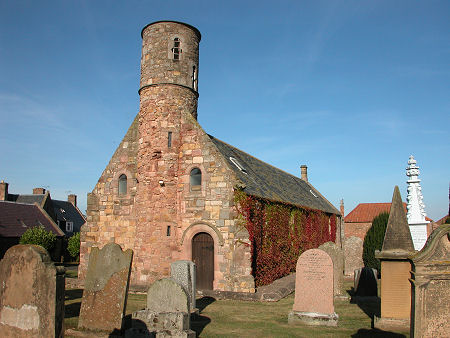The area has many archeological remains which indicate it has been lived in and fought over since the Bronze Age. It lies close to the old invasion route from England into Scotland. Cockburnspath was initially known as Kolbrand’s Path.
The lands of Cockburnspath must have at some point reverted to the Crown as they were part of the dowry given by James IV of Scotland to Margaret Tudor (daughter of Henry VII of England) on their marriage in 1503. This was known as the Marriage of the Thistle and the Rose, representing the Scottish and English national symbols.The 16th century market cross in the heart of the village has carved emblems of a thistle on two of its faces and a rose on the other two.
The parish church has an unusual round tower. There is also a mediaeval Collegiate Church at Dunglass, within the parish, which is maintained by Historic Scotland and is open to the public.

Then the LORD said to Moses, "See, I have chosen Bezalel son of Uri, the son of Hur, of the tribe of Judah, and I have filled him with the Spirit of God, with skill, ability and knowledge in all kinds of crafts- to make artistic designs for work in gold, silver and bronze, to cut and set stones, to work in wood, and to engage in all kinds of craftsmanship. Moreover, I have appointed Oholiab son of Ahisamach, of the tribe of Dan, to help him. Also I have given skill to all the craftsmen to make everything I have commanded you: the Tent of Meeting, the ark of the Testimony with the atonement cover on it, and all the other furnishings of the tent- the table and its articles, the pure gold lampstand and all its accessories, the altar of incense, the altar of burnt offering and all its utensils, the basin with its stand- and also the woven garments, both the sacred garments for Aaron the priest and the garments for his sons when they serve as priests, and the anointing oil and fragrant incense for the Holy Place. They are to make them just as I commanded you." (Exodus 31.1-11)
From the sixth hour until the ninth hour darkness came over all the land. About the ninth hour Jesus cried out in a loud voice, "Eloi, Eloi, lama sabachthani?"—which means, "My God, my God, why have you forsaken me?"
When some of those standing there heard this, they said, "He's calling Elijah."
Immediately one of them ran and got a sponge. He filled it with wine vinegar, put it on a stick, and offered it to Jesus to drink. The rest said, "Now leave him alone. Let's see if Elijah comes to save him."
And when Jesus had cried out again in a loud voice, he gave up his spirit.
At that moment the curtain of the temple was torn in two from top to bottom. The earth shook and the rocks split. The tombs broke open and the bodies of many holy people who had died were raised to life. They came out of the tombs, and after Jesus' resurrection they went into the holy city and appeared to many people.
When the centurion and those with him who were guarding Jesus saw the earthquake and all that had happened, they were terrified, and exclaimed, "Surely he was the Son of God!"
Many women were there, watching from a distance. They had followed Jesus from Galilee to care for his needs. Among them were Mary Magdalene, Mary the mother of James and Joses, and the mother of Zebedee's sons. (Matthew 27.45-56)
When I survey the wondrous cross
On which the Prince of glory died,
My richest gain I count but loss,
And pour contempt on all my pride.
Forbid it, Lord, that I should boast,
Save in the death of Christ my God!
All the vain things that charm me most,
I sacrifice them to His blood.
See from His head, His hands, His feet,
Sorrow and love flow mingled down!
Did e’er such love and sorrow meet,
Or thorns compose so rich a crown?
His dying crimson, like a robe,
Spreads o’er His body on the tree;
Then I am dead to all the globe,
And all the globe is dead to me.
Were the whole realm of nature mine,
That were a present far too small;
Love so amazing, so divine,
Demands my soul, my life, my all.
Isaac Watts (1674-1748)

No comments:
Post a Comment